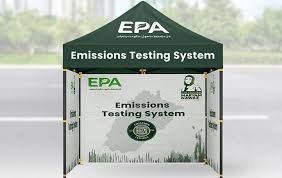In a significant move toward environmental sustainability, the Government of Pakistan is set to introduce EPA tests for vehicles on motorways. The decision comes as a growing number of vehicles contribute to the rising levels of air pollution in major cities across the country. This initiative will involve on-spot vehicle emissions testing by the Environmental Protection Agency (EPA) to ensure compliance with national environmental standards.
The new policy, expected to roll out in phases, aims to address vehicular emissions—one of the leading causes of smog and poor air quality in urban centers like Lahore, Karachi, and Islamabad. Motorways, being a primary route for intercity travel, have become a focal point for authorities to begin testing efforts. According to officials, vehicles failing the EPA test will be fined or even restricted from entering motorway tolls until compliance is achieved.
Why Is the EPA Test Being Enforced on Motorways?
The primary goal of this decision is to control environmental pollution from vehicles, which are known to emit high levels of nitrogen oxides (NOx), carbon monoxide (CO), and particulate matter (PM). These pollutants have not only degraded Pakistan’s air quality but have also led to serious health concerns, especially respiratory and cardiovascular diseases among the population.
The motorway vehicle test initiative will allow authorities to monitor pollution from diesel trucks, buses, and even private cars that travel long distances regularly. These vehicles often bypass city-based checks and remain unnoticed. Implementing real-time emissions testing at motorway entry points ensures that only roadworthy and eco-friendly vehicles are allowed to operate on national highways.
How Will the EPA Test Work?
According to the Environmental Protection Department, vehicles will undergo a quick exhaust emissions test at motorway checkpoints. The test will check for hydrocarbons, carbon monoxide, and smoke density. The procedure is expected to take just 5 to 10 minutes, minimizing inconvenience to travelers.
Officials are also considering the deployment of mobile EPA testing units equipped with sensors and digital data systems. These units will be stationed at major toll plazas and will issue instant clearance certificates to vehicles that pass the test. Those that fail will be issued a notice, and repeat violators could face suspension of vehicle registration.
Public Reaction and Awareness Campaigns
The decision to implement vehicle emission tests on motorways has received mixed reactions. While environmentalists and health experts have lauded the move, transport unions and some vehicle owners have expressed concerns over delays and lack of preparation.
To ease the transition, the government plans to run nationwide awareness campaigns via social media, radio, and television. Vehicle owners will be educated about the importance of regular maintenance and the environmental damage caused by unchecked emissions. Workshops and service centers are also being encouraged to offer free pre-EPA testing to help motorists avoid fines.
Long-Term Impact on Environment and Policy
Experts believe that the EPA testing policy on motorways will serve as a model for broader implementation across provincial roads and even within city boundaries. If successful, it could drastically reduce carbon footprints and help Pakistan meet its climate obligations under international agreements.
The initiative also opens the door for future integration of electronic vehicle tracking, real-time pollution mapping, and eventually, the promotion of electric and hybrid vehicles as alternatives. Authorities hope that with proper enforcement, the motorway EPA test can become a cornerstone of a cleaner and healthier Pakistan.
Read More: Sindh Announces Tax Cuts for Commercial Vehicle
The introduction of EPA tests for vehicles on motorways marks a bold yet essential step by Pakistan’s government to combat the worsening air quality and pollution levels. With proper enforcement, public cooperation, and transparent policies, this initiative has the potential to significantly improve environmental standards and public health.
Read More: No GST Increased on Hybrid Cars: Relief for Pakistani Auto Industry









